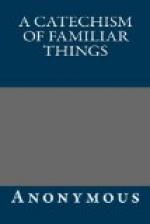It did; the hordes of barbarians who overran Europe wiped out civilization in their progress, and literature, art, and science fled before the wild conquerors to find a refuge in the monastery and the convent. Here knowledge was fostered with the love and ardor which religion alone can impart. Finally, when the rude barbarians were converted, it was to the religious Orders that the world turned for the establishment of schools, and it is to the Church alone, in the person of her popes, her bishops, and her monks that we are indebted for the preservation of learning, and its revival in the fifteenth century.
What celebrated Poets marked this revival?
In Italy, Dante, Ariosto, Petrarch and Tasso.
These were followed, in
France, by Racine, Corneille, Boileau, Voltaire, La
Fontaine and
Delille; in England, by Chaucer, Spenser, Shakspeare,
Milton, Dryden,
Pope, Thomson, Young, Collins, Gray, Byron, Coleridge,
&c; in
Scotland, by Sir Walter Scott; in Ireland, by Thomas
Moore; in
Germany, Klopstock, Goethe and Schiller.
Name some of the distinguished poets of our own country.
Henry Wadsworth Longfellow, William Cullen Bryant, James Russell Lowell, John G. Whittier, Fitz-Greene Halleck, and many others whose meritorious works will be impartially judged by a future age.
Impartially, justly, without prejudice.
Name the different kinds of Poetry.
Epic, or historical; dramatic, or representative,—from drama, the name of all compositions adapted to recitation on the stage—in which are displayed, for instruction and amusement, all the passions, feelings, errors, and virtues of the human race in real life; lyric poetry, or that suited to music, as songs, odes, &c; didactic, or instructive; elegiac, or sentimental, and affecting; satirical, or censorious; epigrammatic, or witty and ludicrous; and pastoral, or descriptive of country life.
Historical, relating to history.
Lyric, pertaining to a lyre.
Didactic, doctrinal; relating to doctrines or opinions.
Elegiac, relating to elegy; mournful, sorrowful.
Elegy, a mournful
song: a funeral composition; a short
poem without points
or affected elegance.
Satirical, severe in language; relating to satire.
Satire, a poem in which wickedness or folly is censured.
Epigrammatic,
relating to epigram,—a short poem ending
in
a particular point or
meaning, understood but not expressed.
Pastoral, from
pastor, a shepherd; relating to rural
employments and those
belonging to shepherds.
What is Astronomy?
The science which treats of the heavenly bodies, their arrangement, magnitudes, distances and motions. The term Astronomy is derived from two Greek words, signifying the law of the stars; astron being the Greek for star.




